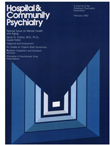Basic Principles of Psychotropic Drug Prescription for the Elderly
Abstract
Elderly patients pose special pharmacological problems. The combination of failing health, an aging body, and multiple drug prescriptions can alter drug effects clinicians would expect to occur in younger patients. Clinicians may also encounter problems of noncompliance or capricious compliance when treating older patients. They should be aware that elderly patients are more susceptible to psychotropic drug toxicity, severe extrapyramidal side-effects from neuroleptics, and anticholinergic side-effects from tricyclic antidepressants. Clinicians should make a complete medical evaluation and determine all of the medications an older patient is taking before they prescribe a psychotropic drug.
Access content
To read the fulltext, please use one of the options below to sign in or purchase access.- Personal login
- Institutional Login
- Sign in via OpenAthens
- Register for access
-
Please login/register if you wish to pair your device and check access availability.
Not a subscriber?
PsychiatryOnline subscription options offer access to the DSM-5 library, books, journals, CME, and patient resources. This all-in-one virtual library provides psychiatrists and mental health professionals with key resources for diagnosis, treatment, research, and professional development.
Need more help? PsychiatryOnline Customer Service may be reached by emailing [email protected] or by calling 800-368-5777 (in the U.S.) or 703-907-7322 (outside the U.S.).



